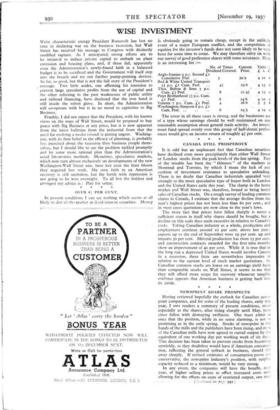WISE INVESTMENT
Wrrii characteristic energy President Roosevelt has lost no time in declaring war on the business recession, but Wall Street has received his message to Congress with distinctly modified rapture. As I anticipated, strong efforts are to be initiated to induce private capital to embark on plant extension and housing plans, and, if these fail, apparently even the Administration's newly-found faith in a balanced budget is to be sacrificed and the Government will itself step into the breach and try out further pump-priming devices. So far, so good, but that is not the full story of the President's message. Two little asides, one affirming his intention to prevent large speculative profits from the use of capital and the other referring to the past weaknesses of public utility and railroad financing, have disclosed that the iron hand is still inside the velvet glove. In short, the Administration will co-operate with but is in no mood to capitulate to Big Business.
Frankly, I did not expect that the President, with his known views on the ways of Wall Street, would be prepared to buy peace with Big Business at any price, but it is now apparent from the latest bulletins from the industrial front that the need for evolving a modus vivendi is getting urgent. Washing- ton, with its firm belief in the efficacy of planning, is probably less exercised about the recession than business people them- selves, but I should like to see the problem tackled promptly and by some more rational plan than the Administration's usual hit-or-miss methods. Meantime, speculative markets, which now turn almost exclusively on developments of the new Washington-Wall Street axis, have lost even the faint bloom they acquired last week. My own faith in an American recovery is still unshaken, but the battle with depression is not going to be won overnight. To all but the boldest and strongest my advice is : Play for safety.
















































































































 Previous page
Previous page